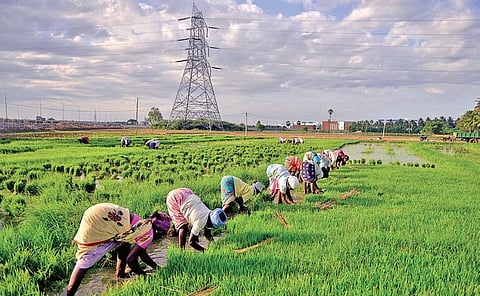

THANJAVUR/TIRUVARUR: Farming is much like gambling; there is no guarantee what the rolling die would yield. Farmers have watched helplessly the flood water gobble up the fruits of their toil, drought ravage their farms, and pests lay waste to their crops. Yet, every year they till their land and sow the seeds hoping that the odds would favour them. And sometimes, they win.
In the rice bowl of Tamil Nadu, excitement among the farmers is palpable. For the first time in eight years, the sluice gates of the Mettur dam were opened on June 12, the customary date. The downpour in the Karnataka catchments ensured that the inflow into the Cauvery was heavy, while the rains in Tamil Nadu yielded the farmers the opportunity to take up samba in the right earnest. The odds seem to be favouring farmers this time around.
“Till two weeks ago, we were not sure about taking up samba cultivation. The storage in the Mettur dam was low. Now, we can take up long-term samba cultivation as the flow into Cauvery is steady,” says B Balasundaram, a farmer from the Peravurani area in the tail-end of the Grand Anaicut Canal of the Cauvery system in Thanjavur.
Balasundaram’s voice echoes the renewed hope among the farmers in the delta districts of Thanjavur and Tiruvarur. With Mettur receiving steady inflow well into the second week of August, farmers in places like Peravurani, where they used to cultivate one long-term samba, have started direct sowing and nursery growing buoyed by the recent rains.
Renewed hope may sound dramatic, but given that the upper riparian Karnataka had failed to release for two months (June & July) the quantum mandated by the Cauvery Water Disputes Tribunal (CWDT) and the Supreme Court, the phrase seems apt. For two months, Tamil Nadu received only 17.14 TMC from Karnataka, taking the accumulated shortfall to a whopping 23.29 TMC.
Taking us through the technical aspect of the water release and acreage are State Deputy General Secretary of Tamil Nadu Farmers Association P S Masilamani, and the Agriculture department officials. “The samba cultivation begins on the back of the record cultivation of short-term kuruvai in the delta districts after 30 years. Opening of the sluice gates of the Mettur reservoir on June 12 has played a major role,” Masilamani says.
According to officials, in Thanjavur, kuruvai was transplanted on 57,000 hectares as against the 37,167 hectares brought under the plough last year. In Tiruvarur, kuruvai spanned 23,000 hectares last year; this year, the figure stood at 38,765 hectares. As kuruvai was cultivated even in areas traditionally brought under the samba crop, the latter’s acreage would come down slightly this year, officials told TNIE.
The newfound excitement is not confined to farmers alone. Agriculture department has enough stock of seeds in the depots to aid samba cultivation. Joint Director of Agriculture, Thanjavur, A Justin said that the department has already issued 250 tonnes long-term samba seeds of the CR1009 sub-1 variety to farmers. The department still has a stock of over 400 tonnes of long-term and 700 tonnes of medium-term seeds.
Tiruvarur officials too are well-prepared. Joint Director of Agriculture P Sivakumar says that they have 2,000 tonnes of seeds stocked up in their depots. Advising caution is the Senior Agro Technologists Forum of Tamil Nadu, which thinks that Mettur dam needs to reach its full capacity one more time this irrigation year for the successful completion of samba. The forum, comprising retired senior agricultural officers and scientists, prepares the annual water budget for the delta region.
The forum advocates direct sowing method to bring down the number of cultivation days and water requirement. “We need water (from Mettur) till September-end, following which the northeast monsoon would take over bringing rains in the delta in October” says an official of the Agriculture department.
However, water alone is insufficient to see the samba season through. Another stumbling block in their way is finance. Their ability to rope in agricultural implements, labour, fertilizer, among others, depends largely on the capacity to raise funds. And that could stack the odds against them.